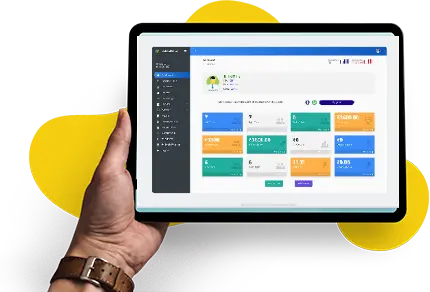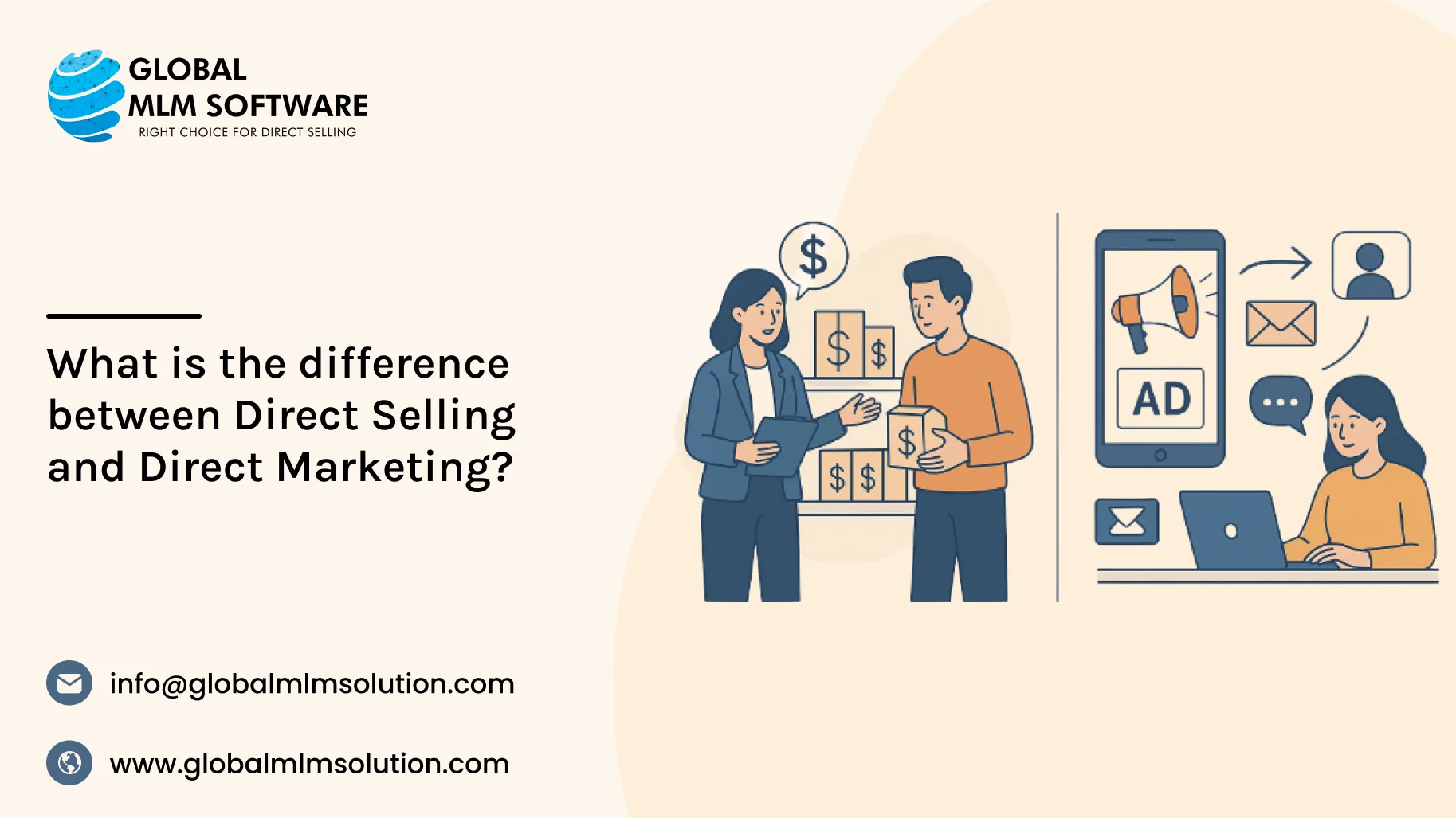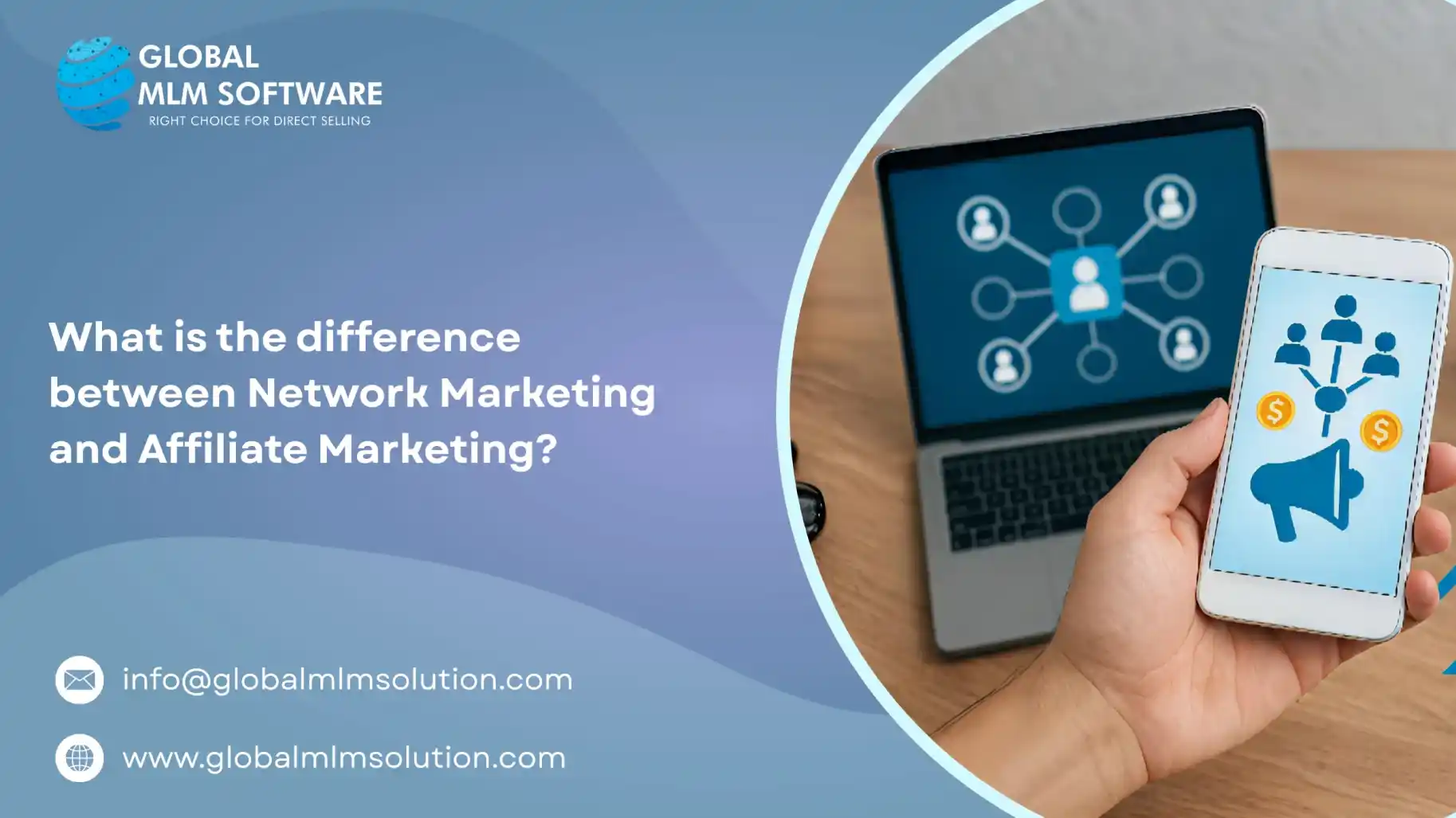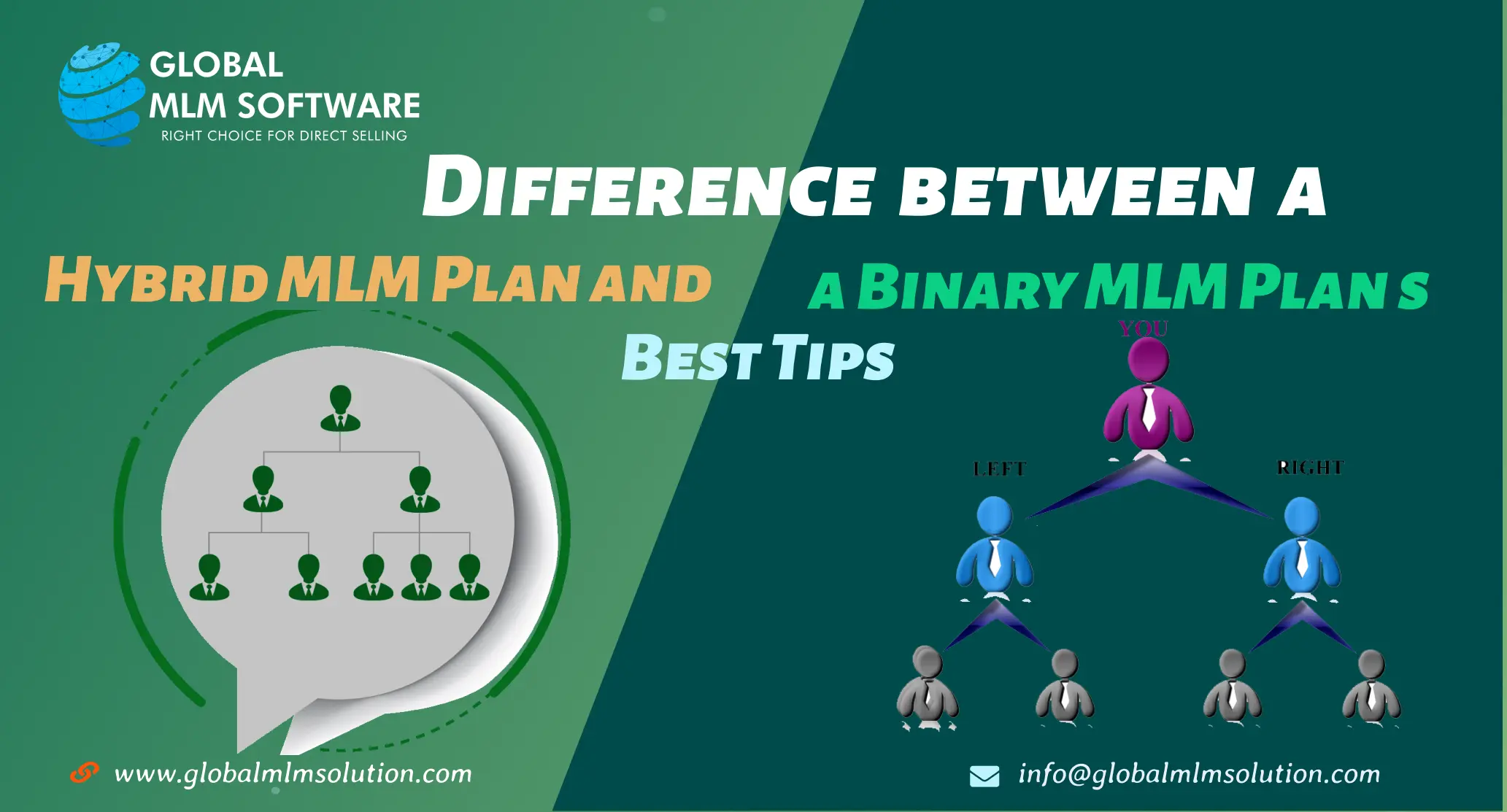Are you having doubts regarding Direct Selling vs Personal Selling? That’s understandable because the phrases sound similar and both involve people selling products.
However, there’s an important distinction: direct selling describes how products are distributed, while personal selling explains how a sale is executed. Understanding this difference is crucial because one answers “How will I distribute my product?,” and the other answers “How will employees or distributors communicate and close sales?”
In the sections that follow, we’ll explore both concepts, reveal where they overlap and differ, and provide a practical checklist to choose the best approach for your business.
This Article Contains:
What is Direct Selling?
When independent sellers (known as distributors) sell a product or service directly to the customer without needing retail stores, it’s called direct selling—a business model. The sellers are usually regular people who choose to work part-time or full-time as distributors.
Additionally, in the direct selling business model, the sellers aren’t paid salaries by a company. Instead, they’re provided with commissions and bonuses for selling products. Direct selling today utilizes apps, websites, and social media. This allows people to easily promote and sell products from anywhere in the world by using just a device connected to the internet.
Here’s how direct selling works:
A seller shows products of the brand he/she is associated with at someone’s home, over a video call, or on social media.
If someone buys something, the seller earns a retail commission (the difference between wholesale and retail prices).
An important aspect is that sellers can recruit more people to build a team of distributors, known as a downline. So when their downline sells a product, they earn commission on those sales as well. It is similar to the concept of generating residual income.
A few common reasons why people prefer joining direct selling companies are:
They can work on their own schedule.
It’s a low-cost home-based business opportunity.
Doesn’t require paying team members to work in their downlines.
They don’t need a store for inventory, as they can sell from home or online, and the company handles logistics.
Examples of direct selling companies:
Amway
Mary Kay
DXN Global
Herbalife Nutrition
Natura & Co
What is Personal Selling?
Personal selling is a sales and marketing strategy where a salesperson interacts directly with a customer to explain, promote, and sell a product or service. It focuses on building trust and relationships so the customer feels confident in making a purchase.
In personal selling, the salesperson talks with the customer to understand their needs and then offers solutions through the product or service. This can happen face-to-face, over the phone, or even through video calls.
Typically, the salesperson answers inquiries, conducts demonstrations, and makes suggestions as part of a consultative approach. Personal selling is a one-on-one selling approach, where each customer is addressed individually. Whereas, in advertising, the aim is to reach a large audience and doesn’t have a two-way communication.
Essentially, personal selling is a key part of the direct selling business model as it relies on personal interaction for sales and promotions.
This strategy is especially effective for products that are expensive, complex, or require a detailed explanation. The companies that benefit from personal selling are:
Real estate firms rely on agents to help people buy or sell homes.
Insurance providers, where agents meet with clients to discuss and recommend the best plans.
Automobile companies where salespeople explain features and guide customers through test drives.
Real-world personal selling examples include luxury brands such as Rolex or Louis Vuitton, where sales associates offer a personalized shopping experience.
Multi-level marketing companies, where distributors host parties and use the door-to-door selling method.
What Is the Difference Between Direct Selling and Personal Selling Explained
So far, it’s established that personal selling is a part of direct selling. But would that mean both are one and the same thing?
Well, no! Besides the difference at the foundational level, one being a sales technique and another being a business model, there are various other differentiations, such as:
| Factor | Direct Selling | Personal Selling |
|---|---|---|
| Nature | Business model (distribution method) | Sales technique (promotional strategy) |
| Sales Channel | Independent distributors sell products directly to consumers. They can sell it personally and through online platforms, such as social media and websites. | Independent distributors of multi-level marketing and employed sales representatives of traditional businesses who interact with buyers. |
| Compensation | Direct selling is a purely commission-based business model for independent sellers. Distributors also earn bonuses and commissions from their downlines if they work with a brand using a two-tier and multi-level marketing model. | It can be compensated in both commission-based and salaried methods, as both MLM and traditional businesses can employ the strategy. |
| Middlemen | No wholesalers or retailers are part of the process. The products are purchased directly from the company and are personally sold. Additionally, some brands do not require distributors to purchase and maintain inventory. They handle the logistics and deliveries to the customers of their distributors. | If this strategy is used in an MLM company, no middlemen are part of the sales process. At the same time, if a traditional business uses it, then sellers need retail stores or showrooms for displaying and demonstrating products. |
| Control | Decentralized as sellers represent the company independently. | Decentralized, if used in MLM, and centralized in traditional businesses, as sales staff are closely managed by the company. |
| Examples | Amway, Avon, Oriflame, Herbalife. | Toyota showroom sales, real estate brokers, insurance agents, and luxury product stores. |
Which One Should You Choose? Clarifying the Doubt
Let’s settle one fundamental fact first. When you run a direct-selling business, you are actually using personal selling.
They are not opponents. Direct selling is the distribution model; personal selling is the one-to-one way you actually sell.
So the real question is not which of the two to pick, but how to apply them logically to your product, market, and goals.
Direct Selling
Direct selling works best when your product is a simple, repeatable consumer item that people can try, talk about, and buy again. Think supplements, cosmetics, home-care goods, and routine wellness items. Here’s why this pairing makes sense:
Product fit
Don't require complex technical explanations.
Have broad market appeal.
Generate repeat purchases.
It can be demonstrated easily in informal settings.
Benefit from personal testimonials and word-of-mouth recommendations.
Natural personal selling situations
Home or online parties where a distributor demos products to friends.
Social posts, short videos, and one-to-one DMs where personal experience is shared.
Quick consultations or demos that answer a specific customer need.
Why does it work?
People trust a real user more than an ad.
Demonstrations remove doubt, so buying feels low risk.
Relationships and word-of-mouth create steady repeat sales.
Personal Selling Beyond Direct Selling
As explained in the direct selling vs personal selling table above, personal selling also belongs inside traditional businesses. There, it is a deliberate tactic used for products that need explanation, customization, demonstrations, or negotiation.
When is personal selling right in traditional business?
High price or technical complexity, for example, cars, homes, enterprise software, or financial products.
Long sales cycles that require needs analysis and follow-up.
Industries where regulated advice or licensing matters, for example, insurance and investments.
Employment versus entrepreneurship
In a direct-selling setup, distributors are entrepreneurs. They build networks, manage their own schedules, and earn commissions and overrides. However, in traditional companies, personal sellers are usually employees or licensed agents. They have a structured pay system, training programs, leads, and company oversight.
How to Choose: A Short Decision Checklist!
Here’s a quick checklist to help you decide when to use direct selling vs personal selling.
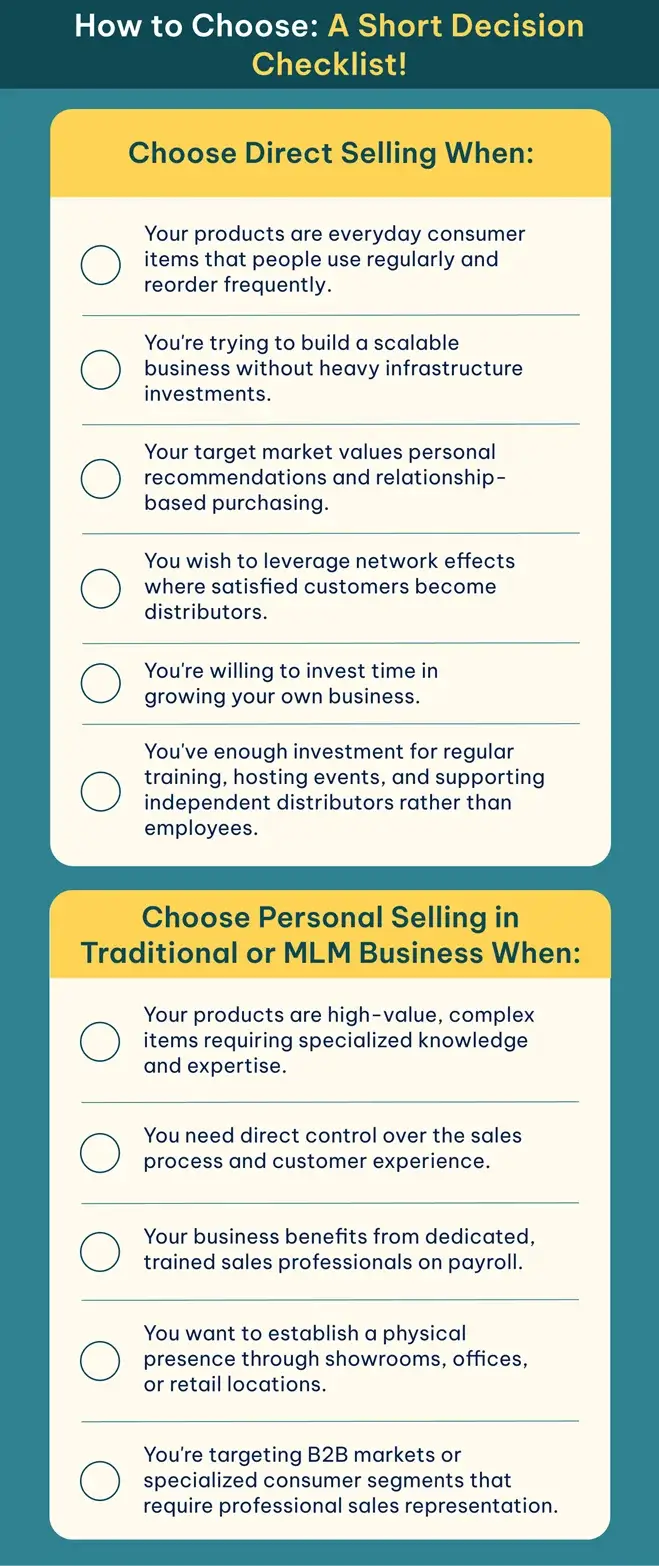
Additionally, you do not always have to pick only one. Many companies use direct selling for consumer channels and a personal sales force for high-value customers. That means you can match the channel to the buyer, not the other way around.
Conclusion
It’s normal to get confused between business concepts that look similar at first glance. Just like many people mix up network marketing and affiliate marketing, others also assume that direct selling and personal selling are the same. When in reality, they’re quite different. And these distinctions matter.
Therefore, spend some time developing a thorough awareness of the options available before implementing them. If you choose one without clarity, it can result in misaligned plans, wasted effort, and lost opportunities. Making an informed decision, on the other hand, guarantees that your sales strategy is in line with your product, target demographic, and long-term objectives.
Key takeaway: You may choose direct selling for everyday consumer products that can be sold through larger networks. Select personal selling for high-value or complex product/service offerings needing expert consultation.
FAQs
1. Are direct selling and personal selling the same thing?
No, direct selling and personal selling aren’t the same thing. Direct selling is a business model where independent distributors sell a company’s product directly to customers. It doesn’t involve any middlemen or require any physical storefront to operate. On the contrary, personal selling is a sales and marketing technique used by both direct selling and traditional businesses to sell products. It’s a one-on-one or face-to-face selling method where a salesman uses the consultative approach to sell a product.
2. What are the main pros and cons of direct selling?
The benefits of direct selling for entrepreneurs include:
Requires low upfront investment.
Establishes better customer relationships.
Increases the chances of repeat business.
Lower overhead costs as there is no need to pay fixed salaries to distributors.
The business expansion can be quick depending on how quickly distributors join and form downlines.
Provides distributors with the flexibility to sell however and wherever, helping them to work without pressure.
The MLM enterprise challenges of direct selling, or we can say disadvantages, are:
High distributor attrition rates.
Business growth relies on distributors' performance.
Control over distributors is challenging as they join from multiple locations.
Difficult to manage brand reputation and compliance with changing FTC guidelines.
3. What are the main pros and cons of personal selling?
The primary advantages of personal selling for both MLM and traditional businesses include:
Helps build trust with the customers.
Gives a better chance at negotiations.
Higher customer engagement rate because of the face-to-face sales method.
Helps personalize sales pitches according to customer needs and expectations.
The consultative nature and real-time demonstrations increase conversion rates.
Establishes two-way communication that allows understanding user concerns quickly.
Allows sales representatives to address customer queries on hand and build long-term, trustworthy relationships.
Some of the disadvantages of personal selling are:
Businesses, specifically traditional ones, face the limited reach issues.
Traditional businesses have to invest heavily to train their sales representatives
It’s a time-consuming sales approach, as it requires convincing clients face-to-face or over the phone.
There’s an inconsistency in the sales skills of employees in a traditional company and distributors in an MLM company.
4. Can you give examples of companies using direct selling?
There are various popular direct selling companies, such as Herbalife, Nature & Co., Amway, Coway, doTERRA, Oriflame, Tupperware, eXp Realty, Vorwerk, and more.
5. Is direct selling the same as a pyramid scheme?
No, direct selling is different from a pyramid scheme because it doesn’t put recruitment over sales. Distributors earn commission primarily from personal sales and from the sales made by their downline. Whereas in a pyramid scheme, people are paid commissions only to recruit others.
Disclaimer: Global MLM Software do not endorse any companies or products mentioned in this article. The content is derived from publicly available resources and does not favor any specific organizations, individuals or products.




